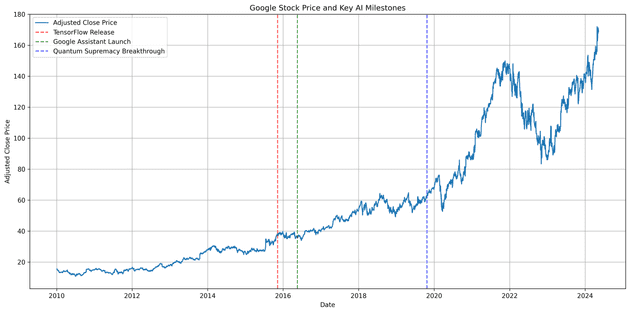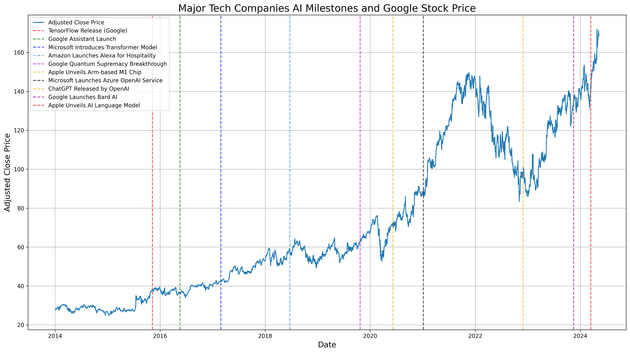Google's journey through the development and marketing of AI technologies such as the Gemini series provides a fascinating case study of the interplay between corporate promises, stock market performance, and technological innovation. This analysis delves into specific historical points where Google's AI promises have significantly influenced its stock prices, alongside a review of its successes and failures.
The tech giant's foray into AI has been marked by ambitious projects and bold claims. From the introduction of TensorFlow in 2015, which established Google as a leader in AI research and development, to the launch of Google Assistant in 2016, which enhanced its competitiveness against rivals like Amazon's Alexa and Apple's Siri, Google has consistently aimed to push the boundaries of AI capabilities [1].
Key Historical Milestones in Google's AI Development
-
Introduction of TensorFlow (2015): Google open-sourced TensorFlow, its machine learning framework, which became widely popular. This move helped establish Google as a leader in AI research and development, positively impacting its market perception [1]. TensorFlow has been used in various applications, from improving search results to powering self-driving cars.
-
Launch of Google Assistant (2016): The introduction of Google Assistant enhanced Google's competitiveness in AI against rivals like Amazon's Alexa and Apple's Siri. This was well-received by the market, reflecting potential growth in AI-driven user interfaces [2]. Google Assistant has been integrated into smartphones, smart home devices, and cars, making it a key player in the voice assistant market.
-
Advancements in Quantum Computing (2019): Google announced a quantum supremacy breakthrough, claiming its quantum computer could perform calculations beyond the capabilities of traditional supercomputers. This announcement led to a brief spike in stock prices, showcasing investor enthusiasm for Google's cutting-edge technological capabilities [3].
Stock Market Performance and AI Milestones
The stock market has reacted variably to Google's AI developments. Significant announcements, such as breakthroughs in quantum computing and new AI product launches, typically result in short-term stock price increases. However, the long-term impact on stock prices has been more closely tied to the actual deployment and commercial success of these technologies.
- S&P 500 Milestones: Google's major AI announcements often coincided with broader market trends. For instance, the broader bull market of 2021 saw Google reaching new stock price highs alongside significant advancements in AI, reflecting a strong investor confidence in tech-driven growth [4].

Successes and Failures
-
Successes: Google's AI has achieved considerable success in areas like language translation, image recognition, and autonomous driving technology through Waymo. These successes have helped solidify Google's reputation as a technology innovator [5].
-
Failures: Not all of Google's AI initiatives have met the market's expectations. For example, the much-anticipated Google Glass project failed to resonate with consumers, leading to its discontinuation. The product faced privacy concerns and failed to provide a compelling use case for the average consumer. Similarly, the delays and overpromises surrounding the Gemini 1.5 Pro have led to user dissatisfaction and skepticism [6]. Google has learned from these failures, focusing on more pragmatic AI applications and improving its communication with users.

Market Impact and Future Outlook
The market impact of Google's AI has been significant, influencing not only its stock prices but also the broader tech industry's direction. The AI sector continues to be a major focus for investors, as seen in the S&P 500's performance, where tech stocks play a substantial role [4].
Looking forward, Google's ability to fulfill its AI promises and overcome the challenges of technological deployment will be crucial. The company's strategy to enhance transparency and manage consumer expectations more effectively could determine its future market position and investor trust.
One key area to watch is Google's progress with its Gemini series of AI models. The Gemini 1.5 Pro, announced in February 2024, promises a significant leap in AI capabilities but has faced challenges in its rollout [6]. How Google navigates these challenges and delivers on its promises will likely have a notable impact on its AI reputation and market standing.
Google's ambitious advancements in artificial intelligence, particularly through its Gemini series, signify a transformative era in AI technology. The introduction of Gemini 1.5 Pro, as part of this series, highlights Google's commitment to pushing the boundaries of AI capabilities. However, the rollout of Gemini 1.5 Pro has not been without its challenges, which are crucial to understanding both the potential and the limitations of such advanced AI models.
Expert Opinions on Gemini 1.5 Pro
Performance and Capabilities: Gemini 1.5 Pro, built on a Mixture-of-Experts (MoE) architecture, offers significant improvements over previous models, including a massive increase in the context window up to 10 million tokens. This enhancement allows for better handling of complex tasks involving large volumes of data across various formats—text, code, vision, and audio [7]. According to Stephen Oladele of Encord, "Gemini 1.5 Pro maintains near-perfect recall across the entire context and uses a mixture-of-experts architecture for more efficient training & higher-quality responses" [7].
Challenges in Rollout: Despite its advanced capabilities, the rollout of Gemini 1.5 Pro has faced several challenges. The model is currently in private preview, and its general availability is scheduled for later, indicating a phased approach to deployment [7]. This cautious rollout strategy might be due to the need to fine-tune the model further and ensure it meets the high expectations set by its predecessors and the market.
Industry Analysts' Views
Impact on the AI Industry: Industry analysts see the Gemini series as a significant step forward for Google, potentially setting new standards for what AI models can achieve. The Gemini series, particularly the 1.5 Pro, is expected to enhance Google's competitiveness against other tech giants like OpenAI and Microsoft, which have also been aggressively advancing their AI capabilities [8] [7].
Market Implications: The advancements in Gemini 1.5 Pro are likely to influence various sectors, including healthcare, finance, and more, by enabling more sophisticated AI applications. This could lead to shifts in market dynamics where companies that effectively integrate such advanced AI technologies may gain a significant competitive edge [7].
Insights from Google Executives
Future Plans and Ethical Considerations: Google executives, including Sundar Pichai, have emphasized the company's commitment to responsible AI development. Pichai has highlighted the importance of aligning AI advancements with ethical guidelines and ensuring that these technologies are used for societal benefit [2] [9]. This approach is crucial as AI becomes increasingly capable and integrated into everyday applications.
Navigating Challenges and Opportunities
Addressing Technical Challenges: To navigate the challenges ahead, Google must continue to invest in research and development to address issues like model reliability and ethical concerns. The company's approach to gradually rolling out Gemini 1.5 Pro suggests a strategy focused on mitigating risks before they become significant problems [7].
Expanding Market Opportunities: Google can leverage the capabilities of Gemini 1.5 Pro to create new market opportunities, particularly in sectors that require handling large datasets and complex problem-solving scenarios. By providing tools that simplify the integration of AI into business processes, Google can help industries transform their operations and achieve greater efficiencies [10].
Ethical AI Development: As AI technologies become more powerful, the ethical implications become more significant. Google's ongoing commitment to responsible AI development, as demonstrated by its AI principles and governance frameworks, will be crucial in maintaining public trust and regulatory compliance [11].
In conclusion, while the rollout of Gemini 1.5 Pro presents challenges, it also offers substantial opportunities for Google to lead in the AI space. By continuing to focus on performance enhancements, ethical AI development, and market expansion, Google can navigate these challenges effectively and set new standards for what AI can achieve in various industries.
Conclusion
Google's AI journey illustrates the complex dynamics of technological innovation, market expectations, and corporate strategy. While the company has experienced both notable successes and setbacks, its ongoing efforts in AI continue to attract significant market attention. Investors and market watchers will likely keep a close eye on Google's ability to leverage its AI capabilities into sustainable growth and market leadership.
As the AI landscape continues to evolve rapidly, Google's position as an AI pioneer will be tested. The company's ability to balance ambitious innovation with realistic execution, transparent communication, and effective expectation management will be critical factors in determining its long-term success in the AI domain and its overall market performance.
References
1. Emeritus - Google AI Strategy
2. Google Blog - Gemini AI
3. Yahoo Finance - GOOGL Quote
4. Wikipedia - S&P 500 Milestones
5. Think with Google - AI Tools
6. Times of India - Gemini 15 Pro AI Release
7. Encord - Google Gemini 1.5 Generative AI Model with Mixture of Experts
8. Built In - Google Gemini
9. CBS News - Google's AI Future
10. Google Cloud - Generative AI
11. Google Blog - Responsible AI

Comments